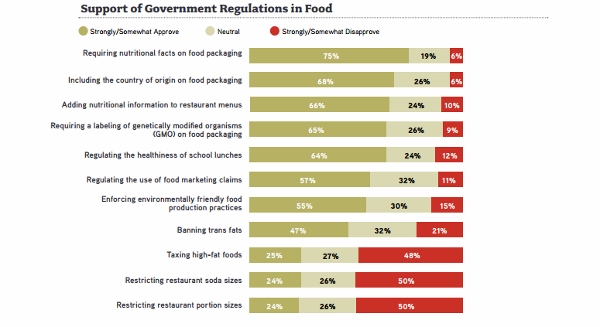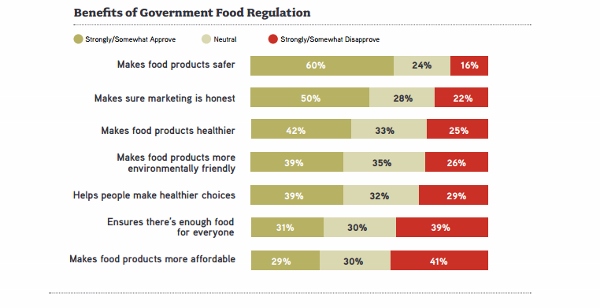The question of whether or not the government should regulate the food industry seems like a simple one, but it’s really an incredibly complex topic. Variables like price, availability, variety of offerings, and quality of products are all involved. Also, there’s the issue of how much regulation the food industry should have. Should it all be regulated? None? Or maybe somewhere in the middle?
To help us make sense of the issue, Sullivan Higdon & Sink (SHS) has produced its latest White Paper, Regulation Nation. Through their research, they’ve learned the issue of food regulation comes down to a lot more than a simple yes we should have it, or no we shouldn’t.
Regulation Benefits: Food is safer, healthier, better-quality.
Regulation Negatives: limit choices, restrict freedoms, and ultimately drive up costs.
Consumers don’t trust food companies to self-regulate, but also don’t trust government to act in best interest. Only 1 in 4 of consumers surveyed by SHS trust the government to act in their best interest, and 45 percent said they cannot trust food manufacturers to self-regulate.
Seventy-three percent of consumers agree with the statement, “I should take the initiative to learn about my food rather than trusting food manufacturers and government agencies.”
The people surveyed by SHS were fairly evenly split on their thoughts about the current amount of food regulation by the government.
Organic consumers and Millennials are more likely to support more government regulation. Bad cooks and those living in urban communities are more likely to feel the current amount of government regulation is enough. Gen-Xers and those living in small cities or rural areas are more likely to feel the government already has too many restrictions on food.
Seventy-five percent of consumers surveyed said they strongly approved of requiring nutritional information on food packaging, and 66 percent said they would support adding nutritional information to restaurant menus.
Sixty-five percent of consumers think food packaging should include labels for GMOs, and 64 percent of consumers feel school lunch healthiness should be regulated.
Only 47 percent of consumers support banning trans fats, and a quarter or less of consumers support taxing high-fat foods, restricting restaurant soda size or restricting restaurant portion size.
Sixty percent of consumers feel government regulation makes food products safer, while 29 percent feel it makes food products more affordable.
Forty-one percent of consumers agree with the statement, “If a company is allowed to sell a food product, I assume it’s safe to eat.”
Ultimately, it seems that consumers are asking the government to give some guidance to the food industry, as long as the guidance doesn’t eliminate consumers’ ability to make their own choices about what they eat.
Also Read:
Why Do (or Don’t) We Eat Healthy Food?
What Do Americans Eat? Kale, Gluten-Free, and Organics Top 2024 Food Trends
Highly Evolved: The New Grocery Shopper is Savvy, Cavalier and Frugal
Images from Sullivan Higdon & Sink, Regulation Nation




